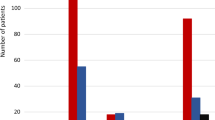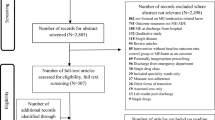Abstract
Rationale
ADHD is a prevalent and morbid neurobiological disorder affecting up to 5% of adults. While stimulants have been documented to be safe and effective in adults with ADHD, uncertainties remain about adherence to these treatments.
Objectives
The main aim of this article was to evaluate contemporaneous rates and correlates of adherence to stimulants in adults with ADHD using data from electronic medical records from a large healthcare organization focusing on timely renewal of an initial prescription.
Methods
Subjects were patients 18 to 44 years of age who had been prescribed a stimulant between January 1, 2015, and December 31, 2016. Prescription and sociodemographic data were extracted from the Partners HealthCare Research Patient Data Registry (RPDR). Our outcome metric was renewal of the index stimulant prescription defined as the first prescription recorded in the electronic record for the period under investigation.
Results
We identified 2689 patients with an index prescription for a stimulant medication. Results showed that only 42% of patients renewed their prescriptions in a timely enough fashion to be considered consistently medicated.
Conclusions
Results indicate that adults with ADHD have a low rate of renewal of their initial stimulant prescription indicating poor patient engagement in their treatment for ADHD.
Similar content being viewed by others
References
Adler LD, Nierenberg AA (2010) Review of medication adherence in children and adults with ADHD. Postgrad Med 122:184–191
Ahmed R, Aslani P (2013) Attention-deficit/hyperactivity disorder: an update on medication adherence and persistence in children, adolescents and adults. Expert Rev Pharmacoecon Outcomes Res 13:791–815
Barbaresi WJ, Colligan RC, Weaver AL, Voigt RG, Killian JM, Katusic SK (2013) Mortality, ADHD, and psychosocial adversity in adults with childhood ADHD: A prospective study. Pediatrics 131:637–644
Biederman J, Faraone S, Milberger S, Guite J, Mick E, Chen L, Mennin D, Marrs A, Ouellette C, Moore P, Spencer T, Norman D, Wilens T, Kraus I, Perrin J (1996) A prospective 4-year follow-up study of attention-deficit hyperactivity and related disorders. Arch Gen Psychiatry 53:437–446
Biederman J, Mick E, Surman C, Doyle R, Hammerness P, Harpold T, Dunkel S, Dougherty M, Aleardi M, Spencer T (2006a) A randomized, placebo-controlled trial of OROS-methylphenidate in adults with attention-deficit/hyperactivity disorder. Biol Psychiatry 59:829–835
Biederman J, Monuteaux M, Mick E et al (2006b) Is cigarette smoking a gateway to alcohol and illicit drug use disorders? A study of youths with and without attention deficit hyperactivity disorder. Biol Psychiatry 59:258–264
Biederman J, Monuteaux MC, Mick E et al (2006c) Young adult outcome of attention deficit hyperactivity disorder: a controlled 10-year follow-up study. Psychol Med 36:167–179
Biederman J, Fried R, Monuteaux MC, Reimer B, Coughlin JF, Surman CB, Aleardi M, Dougherty M, Schoenfeld S, Spencer TJ, Faraone SV (2007) A laboratory driving simulation for assessment of driving behavior in adults with ADHD: a controlled study. Ann General Psychiatry 6:4
Biederman J, Petty CR, Fried R, Kaiser R, Dolan CR, Schoenfeld S, Doyle AE, Seidman LJ, Faraone SV (2008) Educational and occupational underattainment in adults with attention-deficit/hyperactivity disorder: a controlled study. J Clin Psychiatry 69:1217–1222
Biederman J, Fried R, DiSalvo M, et al. (In Press) Further evidence of low patient engagement to stimulant treatment in pediatric ADHD: an electronic health records study. Psychiatric Services
Canadian ADHD Resource Alliance. (2008) Canadian ADHD Practice Guidelines. Available at: http://www.caddra.ca
Chang Z, D’Onofrio BM, Quinn PD, Lichtenstein P, Larsson H (2016) Medication for attention-deficit/hyperactivity disorder and risk for depression: a nationwide longitudinal cohort study. Biol Psychiatry 80(12):916–922
Chang Z, Quinn PD, Hur K, Gibbons RD, Sjölander A, Larsson H, D’Onofrio BM (2017) Association between medication use for attention-deficit/hyperactivity disorder and risk of motor vehicle crashes. JAMA Psychiatry 74(6):597–603
Chen Q, Sjolander A, Runeson B, D'Onofrio BM, Lichtenstein P, Larsson H (2014) Drug treatment for attention-deficit/hyperactivity disorder and suicidal behaviour: register based study. BMJ 348(jun18 18):g3769–g3769
Dalsgaard S, Leckman JF, Mortensen PB, Nielsen HS, Simonsen M (2015) Effect of drugs on the risk of injuries in children with attention deficit hyperactivity disorder: a prospective cohort study. Lancet Psychiatry 2:702–709
Faraone SV, Buitelaar J (2010) Comparing the efficacy of stimulants for ADHD in children and adolescents using meta-analysis. Eur Child Adolesc Psychiatry 19:353–364
Faraone SV, Glatt SJ (2009) A comparison of the efficacy of medications for adult attention-deficit/hyperactivity disorder using meta-analysis of effect sizes. J Clin Psychiatry 71:754–763
Faraone SV, Glatt SJ (2010) A comparison of the efficacy of medications for adult attention-deficit/hyperactivity disorder using meta-analysis of effect sizes. J Clin Psychiatry 71:754–763
Fayyad J, De Graaf R, Kessler R et al (2007) Cross-national prevalence and correlates of adult attention-deficit hyperactivity disorder. Br J Psychiatry 190:402–409
Gajria K, Lu M, Sikirica V, Greven P, Zhong Y, Qin P, Xie J (2014) Adherence, persistence, and medication discontinuation in patients with attention-deficit/hyperactivity disorder - a systematic literature review. Neuropsychiatr Dis Treat 10:1543–1569
Jerome L, Habinski L, Segal A (2006) Attention-deficit/hyperactivity disorder (ADHD) and driving risk: a review of the literature and a methodological critique. Curr Psychiatry Rep 8:416–426
Kendall T, Taylor E, Perez A, Taylor C, on behalf of the Guideline Development Group (2008) Diagnosis and management of attention-deficit/hyperactivity disorder in children, young people, and adults: summary of NICE guidance. BMJ 337:a1239
Kessler RC, Adler L, Barkley R et al (2006) The prevalence and correlates of adult ADHD in the United States: results from the National Comorbidity Survey Replication. Am J Psychiatry 163:716–723
Kollins SH, McClernon FJ, Fuemmeler BF (2005) Association between smoking and attention-deficit/hyperactivity disorder symptoms in a population-based sample of young adults. Arch Gen Psychiatry 62:1142–1147
Kooij SJ, Bejerot S, Blackwell A et al (2010) European consensus statement on diagnosis and treatment of adult ADHD: The European Network Adult ADHD. BMC Psychiatry 10:67
Lam LT (2002) Attention deficit disorder and hospitalization due to injury among older adolescents in New South Wales, Australia. J Atten Disord 6:77–82
Lam LT (2005) Attention deficit disorder and hospitalization owing to intra- and interpersonal violence among children and young adolescents. J Adolesc Health 36:19–24
Lichtenstein P, Halldner L, Zetterqvist J, Sjölander A, Serlachius E, Fazel S, Långström N, Larsson H (2012) Medication for attention deficit-hyperactivity disorder and criminality. N Engl J Med 367:2006–2014
Max J, Lansing AE, Koele SL, Castillo C, Bokura H, Schachar R, Collings N, Williams K (2004) Attention deficit hyperactivity disorder in children and adolescents following traumatic brain injury. Dev Neuropsychol 25:159–177
Medori R, Ramos-Quiroga JA, Casas M, Kooij JJS, Niemelä A, Trott GE, Lee E, Buitelaar JK (2008) A randomized, placebo-controlled trial of three fixed dosages of prolonged-release OROS methylphenidate in adults with attention-deficit/hyperactivity disorder. Biol Psychiatry 63:981–989
Mikolajczyk R, Horn J, Schmedt N, Langner I, Lindemann C, Garbe E (2015) Injury prevention by medication among children with attention-deficit/hyperactivity disorder: a case-only study. JAMA Pediatr 169:391–395
Olfson M, Marcus SC, Zhang HF, Wan GJ (2007) Continuity in methylphenidate treatment of adults with attention-deficit/hyperactivity disorder. J Manag Care Pharm 13:570–577
Perwien A, Hall J, Swensen A et al (2004) Stimulant treatment patterns and compliance in children and adults with newly treated attention-deficit/hyperactivity disorder. J Manag Care Pharm 10:122–129
Quinn PD, Chang Z, Hur K, Gibbons RD, Lahey BB, Rickert ME, Sjölander A, Lichtenstein P, Larsson H, D’Onofrio BM (2017) ADHD medication and substance-related problems. Am J Psychiat 174(9):877–885
Segalowitz SJ, Lawson S (1995) Subtle symptoms associated with self-reported mild head injury. J Learn Disabil 28:309–319
Spencer T, Biederman J, Wilens T, Doyle R, Surman C, Prince J, Mick E, Aleardi M, Herzig K, Faraone S (2005) A large, double-blind, randomized clinical trial of methylphenidate in the treatment of adults with attention-deficit/hyperactivity disorder. Biol Psychiatry 57:456–463
Spencer TJ, Adler LA, McGough JJ et al (2007) Efficacy and safety of dexmethylphenidate extended-release capsules in adults with attention-deficit/hyperactivity disorder. Biol Psychiatry 61:1380–1387
Spencer TJ, Brown A, Seidman LJ, Valera EM, Makris N, Lomedico A, Faraone SV, Biederman J (2013) Effect of psychostimulants on brain structure and function in ADHD: a qualitative literature review of magnetic resonance imaging-based neuroimaging studies. J Clin Psychiatry 74:902–917
StataCorp (2017) Stata Statistical Software: Release 15. StataCorp LLC., College Station
U.S. Census Bureau. American Community Survey, 2011-2015 American Community Survey 5-Year Estimates, Table S1903 – Median Income in the Past 12 Months (In 2015 Inflation-Adjusted Dollars). Available at: https://factfinder.census.gov/faces/nav/jsf/pages/community_facts.xhtml
Funding
This study was financially supported in part by the MGH Pediatric Psychopharmacology Council Fund.
Author information
Authors and Affiliations
Corresponding author
Ethics declarations
This study was approved by the Institutional Review Board at Massachusetts General Hospital.
Conflict of interest
Dr. Biederman’s program has received departmental royalties from a copyrighted rating scale used for ADHD diagnoses, paid by Ingenix, Prophase, Shire, Bracket Global, Sunovion, and Theravance; these royalties were paid to the Department of Psychiatry at MGH. Through MGH corporate licensing, he has a US patent (#14/027,676) for a non-stimulant treatment for ADHD, and a patent pending (#61/233,686) on a method to prevent stimulant abuse.
Dr. Biederman reports grants from AACAP, grants from Feinstein Institute for Medical Research, grants from Food & Drug Administration, grants from Headspace, Inc., grants from Lundbeck AS, grants from Neurocentria, Inc., grants from NIDA, grants from Pfizer Pharmaceuticals, grants from Roche TCRC, Inc., grants from Shire Pharmaceuticals, Inc., grants from Sunovion Pharmaceuticals, Inc., grants from NIH, other from Avekshan LLC, personal fees from Akili, personal fees from Shire, personal fees from Alcobra, personal fees from Arbor Pharmaceuticals, Inc., grants from Department of Defense, grants from PamLab, personal fees from Aevi Genomics, personal fees from Guidepoint, personal fees from Medgenics, grants from Merck, grants from SPRITES, personal fees from Ironshore, personal fees from Piper Jaffray, personal fees from MGH Psychiatry Academy, and personal fees from APSARD, outside the submitted work; and Dr. Biederman’s program has received departmental royalties from a copyrighted rating scale used for ADHD diagnoses, paid by Ingenix, Prophase, Shire, Bracket Global, Sunovion, and Theravance; these royalties were paid to the Department of Psychiatry at MGH. Through MGH corporate licensing, he has a US patent (#14/027,676) for a non-stimulant treatment for ADHD, and a patent pending (#61/233,686) on a method to prevent stimulant abuse.
Dr. Ronna Fried received grant research support from Shire Pharmaceuticals and Roche Pharmaceuticals in the past 36 months.
Maura DiSalvo, K. Yvonne Woodworth, Itai Biederman, Haley Driscoll, and Elizabeth Noyes have no conflicts to disclose.
In the past 3 years, Dr. Faraone received income, potential income, travel expenses continuing education support and/or research support from Tris, Otsuka, Arbor, Ironshore, Shire, Akili Interactive Labs, VAYA, Ironshore, Sunovion, Supernus, and Genomind. With his institution, he has US patent US20130217707 A1 for the use of sodium-hydrogen exchange inhibitors in the treatment of ADHD.
Dr. Perlis reports personal fees from Psy Therapeutics, personal fees from Genomind, and personal fees from RID Ventures, outside the submitted work.
Additional information
Publisher’s note
Springer Nature remains neutral with regard to jurisdictional claims in published maps and institutional affiliations.
Rights and permissions
About this article
Cite this article
Biederman, J., Fried, R., DiSalvo, M. et al. Further evidence of low adherence to stimulant treatment in adult ADHD: an electronic medical record study examining timely renewal of a stimulant prescription. Psychopharmacology 237, 2835–2843 (2020). https://doi.org/10.1007/s00213-020-05576-y
Received:
Accepted:
Published:
Issue Date:
DOI: https://doi.org/10.1007/s00213-020-05576-y




